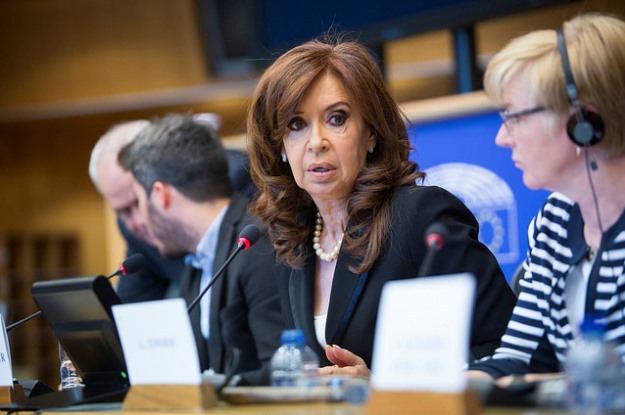If you thought Cristina Fernández de Kirchner was finished with national politics, think again.
Less than two years after relinquishing Argentina’s presidency, the 64-year-old Fernández has been meeting with foreign dignitaries, giving primetime interviews, even tweeting out campaign-style videos – in other words, behaving like a candidate for Congress in October’s midterm elections in all but the official announcement.
The sense in Argentina is that she will run – a decision with substantial implications for her and for her party, said Bruno Binetti, a fellow at the Inter-American Dialogue based in Buenos Aires. She certainly has reasons to go for it, and much to lose if she doesn’t, he added.
For starters, a seat in Congress would provide Fernández with immunity from detention – which could come in handy, since she’s facing multiple investigations over allegations of corruption during her presidency, and these appear to be picking up steam. On May 30, a federal prosecutor called Fernández and her two adult children to testify in a money laundering case in which all three are under investigation.
Fernández has characterized the corruption probes as political attacks from her opponents. She previously rebuffed suggestions that she would run for Congress in the 2015 midterms to secure immunity, ultimately not running and saying she didn’t fear any judge. Still, there’s precedent for former presidents joining Congress in order to get protection from the courts, said Binetti. Former President Carlos Menem, who was convicted of smuggling charges in 2013, is now running for his third term as senator, which would allow him to retain immunity into his 90s.
A position in Congress could also help propel Fernández to another run at the presidency in 2019, allowing her to firm up her base and rebuild a national Peronist coalition, said Binetti.
Fernández had ostensibly ruled out a run for Congress as recently as May 5, when she told a private teachers’ union in Buenos Aires that she wasn’t interested. But just weeks before a June 24 deadline to formally declare her candidacy, the former president indicated that a return to Congress, where she served before the presidency, may still be in the cards.
In a primetime TV interview on May 25, Fernández said that for the sake of her party and its ideals she would be willing to run – likely as a Senator for Buenos Aires province, where approximately 40 percent of the national electorate lives. “We have to put limits on the neoliberal adjustment the country is living through,” Fernández said, referring to the economic program of her successor, Mauricio Macri. “If it’s necessary for me to be a candidate to get the most votes for our proposal, then I’m it.”
The interview came just two days after Fernández met with mayors from the province to discuss their Justicialist Party’s strategy for October, and a day after she met privately with the man many think would be her running mate on a Senate ticket, former Buenos Aires province Governor Daniel Scioli.
Whatever her motivations and challenges, Fernández remains a formidable candidate. A telephone survey conducted by the Analogias polling firm between May 17 and 22 gave a Fernández-Scioli ticket the support of 31.3 percent of intended voters. Her presumed challenger to represent the Justicialist Party, her former interior and transport minister Florencio Randazzo, received only 9.8 percent. An earlier poll conducted in April by Management and Fit, a consultancy, put her support in Buenos Aires province at a competitive 40 percent.
Despite her popularity in the province, getting on the ticket won’t necessarily be easy. Randazzo has insisted on competing in a party primary, while Fernández has discouraged them, contending that primaries would hurt party unity. Further, after 12 years of Kirchner rule, initially under her late husband Néstor Kirchner, Fernández doesn’t hold the kind of influence among members of her party that she once did.
“There’s a whole new generation of governors that have different ideas and different ambitions and they’re probably not willing to be just supporting what Fernández wants,” Binetti said.
A Fernández candidacy could even be counterproductive for the Peronist opposition, said Sergio Berensztein, an Argentine political analyst. “The government wants Fernández to be the Marine le Pen of this election,” Berenzstein said, in reference to France’s defeated and polarizing right-wing presidential candidate. “She looks like a good threat for the independent voter to vote against.”
Fernández would also have history working against her. Former presidents Menem and Raúl Alfonsín both found it difficult to maintain electoral relevance after transitioning from the presidency to Congress, said Berensztein. Furthermore, only three presidents in Argentina’s history have managed a return to the presidential palace after a stint away – Julio Argentino Roca in 1898, Hipólito Yrigoyen in 1928, and Juan Perón in 1973. Neither Yrigoyen nor Perón finished their terms.
“The chance of coming back is very small, but the chance of finishing is even smaller,” Berensztein told AQ. “To win the presidency in Argentina, you have to be a rookie.”
One thing that’s on Fernández’s side, for now, is an economic recovery that’s been slower in arriving than Macri promised. If Fernández is able to win a Senate seat decisively, the government’s legislative agenda and Macri’s vision for the country could both be dealt a damaging blow.
“The government is framing this election as a choice between the future and the past, with Cristina as the past,” Binetti said.
A Fernández triumph could flip that script.
—
O’Boyle is an editor for AQ.








